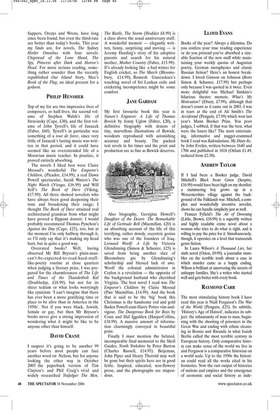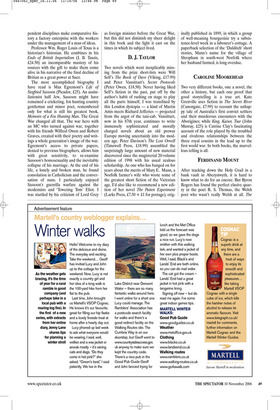R AYMOND C ARR The most stimulating history book I have read
this year is Niall Ferguson’s The War of the World (Penguin, £25). Its subtitle, ‘History’s Age of Hatred’, indicates its subject: the inhumanity of man to man, beginning with the shooting of prisoners in the Great War and ending with ethnic cleansing in Bosnia and Rwanda in what Isaiah Berlin called the most terrible century in European history. Only comparative history can make sense of the world we live in and Ferguson is a comparative historian on a world scale. Up to the 1950s the historian could read all the works cited in his footnotes. Now the vast output of histories of nations and empires and the emergence of economic and social history as inde pendent disciplines make comparative history a factory enterprise with the workers under the management of a man of ideas.
Professor Wm. Roger Louis of Texas is a historian’s historian. He combines in his Ends of British Imperialism (I. B. Tauris, £24.50) an incomparable mastery of his sources with the gift to make them come alive in his narrative of the final decline of Britian as a great power at Suez.
The most accomplished biography I have read is Max Egremont’s Life of Siegfried Sassoon (Picador, £25). An assimilationist half Jew, Sassoon might have remained a cricketing, fox hunting country gentleman and minor poet, remembered only for what is still his greatest book, Memoirs of a Fox Hunting Man. The Great War changed all that. The war hero with an MC who turned against war, together with his friends Wilfred Owen and Robert Graves, created with their poetry and writings a whole generation’s image of the war. Egremont’s access to private papers, denied to previous biographers, allows him with great sensitivity, to re-examine Sassoon’s homosexuality and the inevitable collapse of his marriage. At the end of his life, a lonely and broken man, he found consolation in Catholicism and the conversation of nuns. I particularly enjoyed Sassoon’s guerrilla warfare against the modernists and ‘Towering Tom’ Eliot. I was startled by his criticism of Lord Grey as foreign minister before the Great War, but this did not diminish my sheer delight in this book and the light it cast on the times in which its subject lived.



































































































 Previous page
Previous page